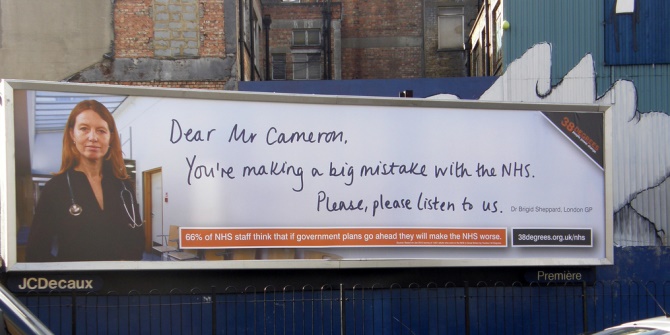Choice in healthcare does not often work in ways that economic models predict and policy makers expect, writes Marianna Fotaki. For example, the evidence that choice leads to greater efficiency is not persuasive. The theory of market imperfections in healthcare demonstrates the problems of replicating such simplistic assumptions about human behaviour in policy settings.
The Coalition government is committed to a particular model of patient choice in healthcare services following a pattern set by previous governments. Patient choice and competition between providers are promoted as a means for achieving greater efficiency and improved quality, as well as an aspect of care that patients value. The idea of patients as choosers shaping service provision has been transplanted into NHS policy from neoclassical economics, but it also responds to long-standing demands by patient and user groups for autonomy and for greater control over the healthcare resources available to them. However, choice in healthcare does not often work in ways that economic models predict and policy makers expect. The theory of market imperfections in healthcare demonstrates the problems of replicating such simplistic assumptions about human behaviour in policy settings. Four key issues can be identified here.
First, the research on implementing patient choice in healthcare suggests that its impact on efficiency and quality is at best very limited, while it may have negative consequences for equity. Overall, the evidence that choice leads to greater efficiency is not persuasive: in marketised health systems administrative expenses are higher while additional losses of efficiency occur due to gaming of the system. Further, introducing competition between providers to improve efficiency relies on an implicit belief that existing NHS providers are intrinsically inefficient which has little basis in evidence.
There are a small number of well-publicised cases under the recent reforms where competition between healthcare providers seeking patients who now have the freedom to choose is said to have improved quality. Yet it is difficult to single out a specific policy initiative as a ‘cause’ of a specific ‘effect’. Setting aside other methodological challenges researchers face, many other factors besides competition influence the quality of hospitals’ services including price structure, payment methods, internal organisation and pre-existing culture in addition to quality regulation systems and protocols. In reality, any impact on quality will depend on the precise institutional setting and on the regime of regulation.
Potential equity implications are more serious. Although users may be generally attracted to the idea of having a choice, research shows that not all groups of patients are able to exercise it in an equal measure. Pre-existing inequalities of income and education influence patients’ access to information and therefore their ability to choose and the choices they make. Choice may also open up new inequalities of access, by disadvantaging the old, those who are not highly numerate or health literate, those who do not have their own means of transport, those with family commitments, and those for whom English is not a first language. Distance remains an issue for many – patients want services locally for themselves and for family reasons while lack of public transport can make choice difficult for people who are unable to afford a car.
Second, the policy ignores the importance of the social, cultural and context-specific factors guiding patients’ choices that help to explain the processes and outcomes of decision-making in health care. Choice means different things to different or the same people at various points in time because users of services share multiple identities as citizens, family and community members, members of religions, and much more. Patients’ ability, and even their willingness to make choices, is influenced by their beliefs, cultural values and expectations as well as their life circumstances, personal characteristics and their experiences of healthcare services. Patients may also be interested in different choices from those envisaged by policy makers, including the choice of primary care doctor or hospital consultant or treatments. But they also want to be able to choose the framework of a shared decision making together with health professionals, rather than as consumers in the market place although this may depend on the health condition involved. For example, patients with long term conditions may be more able to make informed choices.
Third, while individual choice of how, when, who and what services are offered is an important aspect of care, patients are often willing to trade it off against good quality services provided locally by trusted health professionals. The evidence also shows that as citizens and users of the NHS patients are more concerned about retaining the public and universal aspects of their health system than having a choice over the providers of their care. When ranked on a scale of one to five in a recent MORI survey, for the majority (63%) of the British population fairness in public services comes first, whilst choice and the personalisation of services is last. In sum, choice is desirable but not essential for patients to feel empowered, and their need for high quality accessible services supersedes it.
Fourth, choice has always been an irreducible element in healthcare, involving as it does decisions about treatment with profound implications for our well-being as it enables patients to take better care of their lives. Making choice explicit is important for patients but it has to be the right type of choice. This means, meeting patients’ requirements for accessible and usable information about choices, and the availability of face-to-face contact with a knowledgeable and trusted professional capable of interpreting the information. In sum, patients’ desire for more involvement in their healthcare does not automatically translate into having more options to choose from but rather for more support to make informed decisions. And, although it is possible to treat people who seek professional help as customers, this is incompatible with ways of thinking and acting that are crucial to healthcare.
So the type of patient choice that contemporary health policy draws on almost exclusively is based on a flawed account of what choices actually mean for patients. Such conception of choice rests on the simplistic and erroneous assumption that appealing to patients’ self-interest will make them behave as consumers in a market place. For choice to work, policy design needs to recognise patients’ multiple needs and their bonds as community members, addressing them as socially embedded individuals. Users’ prior experiences, including their experience of health services, and how the reality of being ill might affect their health-related decisions, need to be accounted for. Only then can choice be employed in the provision of responsive and effective healthcare.
Note: This article gives the views of the author, and not the position of the British Politics and Policy blog, nor of the London School of Economics. Please read our comments policy before posting. Homepage image credit: 38 degrees.
About the Author
Marianna Fotaki is professor of business ethics at Warwick Business School, The University of Warwick and holds a visiting professorship at The University of Manchester. Before joining academia Marianna has worked as EU resident adviser to the governments in transition and as a medical doctor for Médecins Sans Frontières and Médecins Du Monde for ten years in total.









